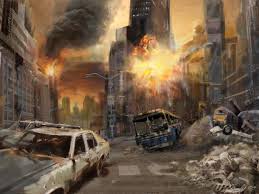记忆方法
将“destroy”分解为“de”和“stroy”,其中“de”暗示有否定的意思,“stroy”与“story”相似,可以想象破坏了一个故事或叙述,从而达到“毁灭”的含义。
以上内容由AI生成, 仅供参考和借鉴
中文词源
destroy 破坏
de-, 夺去,损毁。-stroy, 建造,词源同structure,destruct.
英语词源
- destroy
-
destroy: [13] As in the case of demolish, to destroy something is almost literally to ‘unbuild’ it. The word comes via Old French destruire from *dēstrūgere, a Vulgar Latin alteration of Latin dēstrūere. This was a compound verb formed from the prefix dē-, denoting reversal of a previous state, and strūere ‘pile up, build’ (source of English construct and structure). Its past participle, dēstructus, has produced English destruction [14], destructive [15], and the verb destruct (recorded once in the 17th century but revived in the 1950s by backformation from destruction).
=> construct, destruction, structure - destroy (v.)
- early 13c., from Old French destruire (12c., Modern French détruire) "destroy, ravage, lay waste," from Vulgar Latin *destrugere (source of Italian distruggere), refashioned (influenced by destructus), from Latin destruere "tear down, demolish," literally "un-build," from de- "un-, down" (see de-) + struere "to pile, build" (see structure (n.)). Related: Destroyed; destroying.
权威例句
- 1. They can't destroy truth without destroying each and every one of us.
- 除非他们将我们赶尽杀绝,否则真理不灭。
- 2. Frogs eat pests which destroy crops and carry diseases.
- 青蛙吃破坏庄稼、传播疾病的害虫。
- 3. After the killing, he calmly lit a fire to destroy evidence.
- 杀人后,他镇定地点起火销毁罪证。
- 4. The dispute could destroy Australia's hard-won reputation for industrial stability.
- 这场纠纷可能会让澳大利亚劳资关系稳定这一来之不易的名声毁于一旦。
- 5. Criticizing will only destroy a relationship and create feelings of failure.
- 批评责备只能破坏关系,让人产生失败感。
